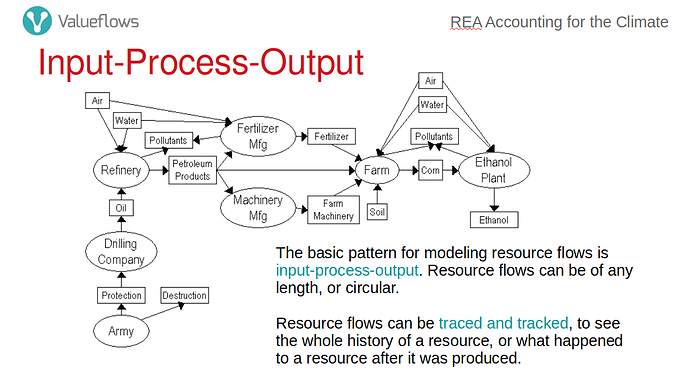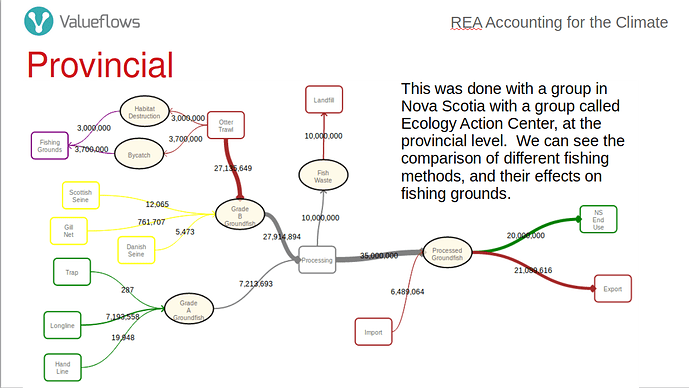The very possibility of pulling resources out of the public and the private regime opens the door for large scale commons-based peer production. In my opinion, this is desirable because it leads to a better allocation of resources in society, more sharing, lower redundancy and fewer externalities.
What would an NRP (REA) algorithm even try to maximize? Universal happiness? “Stakeholder” satisfaction?
And I’m guessing you use the term “stakeholders” in a different sense than the corporate “stakeholders/shareholders”, in that the stakeholders includes everyone, right? And stakes are not transferrable for money, right?
And what does a forest even “produce”? Timber? Rubber? Wildlife-documentaries? It could be anything. And, assuming the majority of stakeholders decide democratically what it is that they wish to maximize (or whatever its REA equivalent of “maximizing-profits” is), how’d they know that they’re maximizing the right things? The way I see it, commons-based peer-production systems are closed systems (in that they don’t depend on outside charity, etc), and are thus self-sustaining? Then that just means you’ve done away with prices, without which can arise no rational decisions, hence no rational allocation!
Found some (partially satisfying) answers from your Quora post; will post it in case anyone is looking for them;
The “value accounting system” captures different types of contributions from contributors to a project ($, material, time, social capital, etc…) and amalgamates them into a dynamic pie share of (fluid) equity, using the “value equation”, which is a social contract that defines the rules of value accounting (how contribution are evaluated and mixed together). This equity is called fluid, because everyone’s share is diluted as soon as someone else adds more value to the project. The equity distribution for a project stabilizes when the project reaches maturity, i.e. when development (design, R&D…) has stopped, when a product has emerged and it is now exchanged on the market.
In the “value network” model equity is not only split between co-founders, but among all participants to the project. There is no clear formal status of founder, which is to recognize the fact that later contributions are as important as the initial idea, and that an idea or an initial initiative can’t go too far without the makers and shakers that will come later.
In the “value network” model, the “value accounting system” is strongly coupled to a “role system”. The “role system” is emergent. The topology of roles within the organization shows different types of activities, how important they are, who is doing what… The role played in a project (technical - R&D, or non technical - writing, etc…) is a modulator in the “value equation”, and therefore affects equity.
In the “value network” model, the “value accounting system” is strongly coupled to a “reputation system”. Reputation has many dimensions. Some of these dimensions can directly impact the ability of contributors to extract value from the system, i.e. act as modulators in the “value equation”, which has a direct impact on equity. Thus reputation acts as a modulator of behavior by affecting equity.
Equity is calculated from contributions, taking into consideration all the modulators, by a “value equation”. The “value equation” is a in fact social contract, and is designed to match the philosophy of the group that implements it.There is no magical solution, only some general guidelines to follow. The “value equation”, which is part of a “value accounting system” must be carefully designed and implemented in context.
Figuring out the “value-equation” (as in your terminology) for something like a forest or land is not only hard, it’s impossible; especially a prior. Everyone has subjective opinions, most of which they do not even know until they are presented with the choice; or as Ford would say:
If I had asked people what they wanted, they would have said faster horses .
Free-markets, unlike democratically setting the “value-equation”, lets everyone make their own subjective preferences, and letting them express them through prices and voluntary trade, thereby making use of insurmountable knowledge, and all that in a decentralized “peer-to-peer” way, hence “maximizing utility for everyone” without ever having to explicitly set the value-equation to be such.
And of course,
A forest is not Wikipedia; PERIOD!





